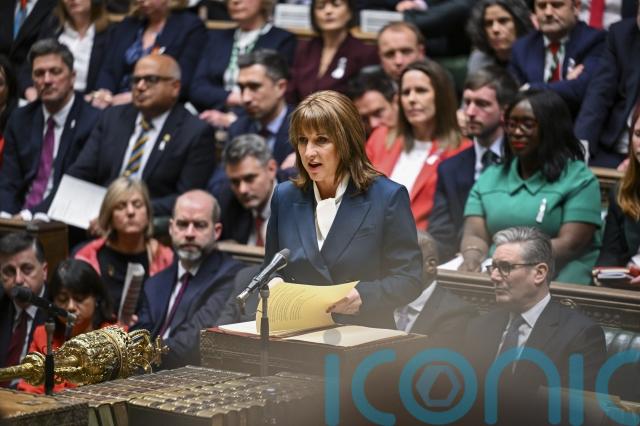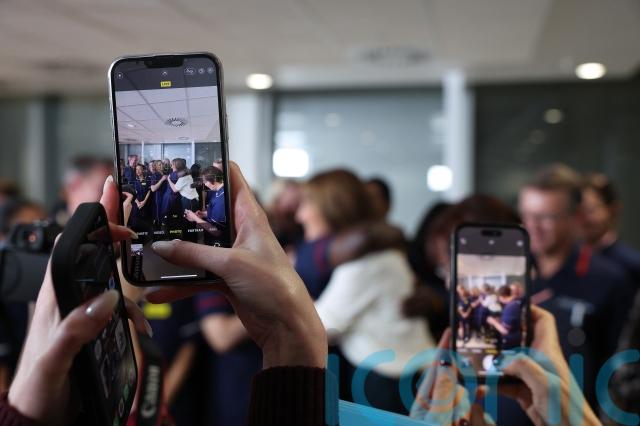
Chancellor Rachel Reeves insisted she will not “preside over a status quo that punishes children for the circumstances of their birth” as she confirmed the scrapping of the controversial two-child benefits limit.
Ditching the policy will result in an estimated reduction of child poverty by 450,000 and cost around £3 billion at the end of this Parliament.
Labour had been under increasing pressure from anti-poverty campaigners, as well as many MPs within its own party, to end a policy introduced under the Conservatives.
Labour MPs Helen Hayes and Debbie Abrahams, who chair the education and work and pensions committees respectively, said it was a “very welcome” move and a “positive start”, but indicated their intention to keep the pressure up by adding they will “keep watch” for the detail in the forthcoming wider strategy on tackling child poverty.
I am incredibly proud that this Labour Government have scrapped the two-child cap on universal credit. This is the most cost-effective measure we could take to lift half a million children out of poverty.
We need to help children thrive by supporting their parents. pic.twitter.com/QWfwtEVzk6
— Catherine West (@CatherineWest1) November 26, 2025
Despite the repeated calls from campaigners and some Labour MPs, YouGov polling earlier this month of just over 5,000 adults suggested 57% were in favour of keeping the policy.
Conservative former chancellor Sir Jeremy Hunt argued that abolishing the cap was “totally unfair” and claimed it would result in “more children, not less, living in the structural poverty caused when there are no adults in the household at work”.
The two-child limit – first announced in 2015 by the Conservatives and which came into effect in 2017 – restricts child tax credit and universal credit (UC) to the first two children in most households.
Ms Reeves and Prime Minister Sir Keir Starmer had both hinted in the lead-up to the Budget that the cap could go.
Ahead of her speech on Wednesday, confirmation the policy will be scrapped from April came from the Office for Budget Responsibility (OBR), which apologised for a “technical error” which led to its economic and fiscal document being published early.
The document said the removal of the policy will cost £2.3 billion in 2026-27 and £3 billion in 2029-30.
It said the Government estimates the change will reduce child poverty by 450,000 by 2029-30 “relative to the level had the two-child limit remained in place”.
Organisations working in the sector argue 109 children across the UK are pulled into poverty by the policy every day.
The change means families, from April 2026, can receive the child element of UC for all children regardless of family size.
The OBR said it will lead to an estimated 560,000 families seeing an increase in their UC award averaging £5,310 per year.
Addressing the House of Commons, Ms Reeves said children had “paid the price for the policies of a party which opted for cynical gimmicks over real savings in our welfare system”.

She told MPs: “I don’t intend to preside over a status quo that punishes children for the circumstances of their birth.”
She said moves to reform gambling taxes, fraud in the welfare system and tax avoidance would all go towards funding the policy change.
She told Parliament: “Because I am tackling fraud and error in our welfare system, because I am cracking down on tax avoidance, because I am reforming gambling taxation, I can announce today – fully costed and fully funded – the removal of the two-child limit in full from April.”
She said Labour “do not believe that the solution to a broken welfare system is to punish the most vulnerable”, adding that the party “is achieving the biggest reduction in child poverty over a parliament since records began”.

She later told reporters, when asked whether she believed measures such as lifting the cap would be enough to appease frustrated backbenchers, that scrapping the policy was “about addressing child poverty and also reducing some of those costs on other parts of the system, including in our NHS and in our schools”.
Former Labour prime minister Gordon Brown, who was among the loudest voices urging the limit to be removed, thanked Ms Reeves “for her decisive stand in favour of childhood equality”.
He described the move as an “invest-now-save-later policy” which will result in improved educational outcomes, greater adult earnings and “which will ultimately pay for itself with higher tax receipts”.
The confirmation the cap will be scrapped was immediately welcomed by organisations which have long campaigned for it to go.
The Child Poverty Action Group said the change “will be transformational for children” and is a “much-needed fresh start in our country’s efforts to eradicate child poverty”, while Unicef UK described it as a “major, necessary decision to tackle record levels of child poverty in the UK”, adding: “No child should be punished for the number of siblings they have.”
Scrapping the two-child limit will be transformational for children. pic.twitter.com/YLMwJHOHGG
— Child Poverty Action Group (@CPAGUK) November 26, 2025
Helen Barnard, director of policy at foodbank network Trussell, branded it a “bold step which will protect hundreds of thousands of children from growing up facing hunger and hardship”, and said the Chancellor had “listened to the families and foodbanks across the UK who have been imploring her to act”.
Action for Children said the move “marks a turning point for struggling families” and is “long overdue and a vital first step towards ending child poverty” while Barnardo’s hailed a “landmark moment” which “could transform life chances for a generation of children”.
The Government has previously said it will publish its wider child poverty strategy this autumn, having been delayed from an initial deadline of spring.
The Department for Work and Pensions estimated that, taking into account the policy change, there will be 4.3 million children in relative low income after housing costs in the final year of this Parliament.
Growing up in poverty is one of the key factors behind poor mental health.We welcome today’s decision to abolish the two-child benefit cap – it will be life-changing and reduces a significant barrier to good mental health #budget2026 pic.twitter.com/CmvKlJWCjz
— Mental Health Foundation (@mentalhealth) November 26, 2025
Chief analyst Peter Matejic, from the Joseph Rowntree Foundation, said removing the limit is “pivotal to the fall in child poverty” but noted that “all modelling is uncertain though, so we will have to see how the published data moves as it comes out”.
The latest data, published by the Government earlier this year, estimated the number of children living in poverty in the UK reached a record high of 4.45 million children in the year to March 2024.
It also showed that most children in poverty are in households with at least one adult in work.
The data, published in March, showed 35% of children in poverty are in households with all adults in work, 37% are in households with at least one adult in work, while just over a quarter (28%) were in “workless households”.
Speaking in Parliament following the Budget, Sir Jeremy said he believed in cutting poverty, but added: “I think financing people to have ever-larger families means more children growing up in poverty, not less.”
Shadow chancellor Sir Mel Stride told reporters the Tories are committed to reimposing the two-child cap if they return to power.
Subscribe or register today to discover more from DonegalLive.ie
Buy the e-paper of the Donegal Democrat, Donegal People's Press, Donegal Post and Inish Times here for instant access to Donegal's premier news titles.
Keep up with the latest news from Donegal with our daily newsletter featuring the most important stories of the day delivered to your inbox every evening at 5pm.